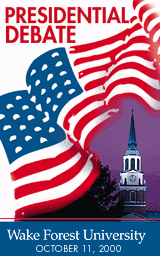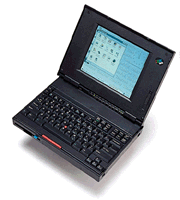Students exploring internet’s use in debate
 Wake Forest University is calling on its students to explore creative ways for using the Internet with the presidential debate coming to the university next fall.
Wake Forest University is calling on its students to explore creative ways for using the Internet with the presidential debate coming to the university next fall.
“When it comes to technology, it pays to turn to college students for innovative ideas,” said Jay Dominick, Wake Forest’s assistant vice president for information systems. “For Wake Forest students, the Internet certainly is a resource they know.”
Wake Forest hosts a presidential debate on Oct. 11. The candidates will meet in the university’s Wait Chapel, where presidential candidates George Bush and Michael Dukakis debated in 1988.
Wake Forest’s national reputation for technology use in education played a role in its selection as a debate site, according to the Commission on Presidential Debates (CPD), which has announced its determination to make extensive use of the Internet in 2000. Last year, Yahoo! Internet Life magazine ranked Wake Forest third among the nation’s 100 most wired colleges and universities.
The CPD has indicated the Internet will play a key role in its efforts to generate greater interest among young people in the fall’s three presidential debates and one vice presidential debate.
The university has pulled together approximately 20 students to look at the Internet’s possibilities in the debate at Wake Forest.
“The students are bringing their own special talents to the group,” said Nancy Crouch, Wake Forest’s director of technology outreach. “Some have been recommended by politics, communication, history and journalism professors. Others are tech-savvy members of the university’s Student Technology Advisors (STARS) program.”
STARS work one-on-one with faculty to assist them in introducing technology into courses in subjects ranging from English to music to biology. In the summer, many serve as interns in the public and private sectors, working for non-profit organizations as well as high-tech corporations. This year, a new STARS team began assisting local high school social studies teachers.
 “Our group is considering a wide range of ideas to help the commission attract and inform young people, especially those in college and high school,” Crouch said. “We may propose something that will directly involve students at a number of other colleges and universities.”
“Our group is considering a wide range of ideas to help the commission attract and inform young people, especially those in college and high school,” Crouch said. “We may propose something that will directly involve students at a number of other colleges and universities.”
She expects Wake Forest to present a written proposal to the CPD in early spring.
“Once the commission approves something, the university will conduct a pilot to make certain our plan works as it is envisioned,” Crouch added.
At the moment, the students are focusing on ideas that will make use of the Internet before, during and after the Wake Forest debate. Anything developed at Wake Forest may also be useful in the commission’s overall effort to generate greater youth interest in all of the fall debates, Crouch said.
Quionna Tinney, a STAR from Richmond, Va., was one of the students quick to get involved in the debate effort.
“As soon as I heard about the possibility of Wake Forest hosting the debates, I immediately wanted to get involved,” said Tinney, a sophomore. “I think it is important for people in my age range to take an interest in politics.”
“When I look back on my college years, the election of 2000 will be more than just the first time that I voted,” Tinney added.
Dates and sites for the other 2000 presidential debates are:
Oct. 3, John F. Kennedy Library and the University of Massachusetts, Boston.
Oct. 17, Washington University, St. Louis.
A debate for vice presidential candidates will be Oct. 5 at Centre College in Danville, Ky.
Wake Forest teamed with the Winston-Salem Convention and Visitors Bureau (CVB) to submit the winning proposal to bring a presidential debate to the Wake Forest campus on Oct. 11.
The university first hosted a presidential debate on Sept. 25, 1988, in Wait Chapel. Three undergraduates proposed the idea to the university in 1987, and the university quickly gave its support to the effort.
Categories: Campus Life, Experiential Learning, Happening at Wake, Research & Discovery
Media Contact
Wake Forest News
media@wfu.edu
336.758.5237



